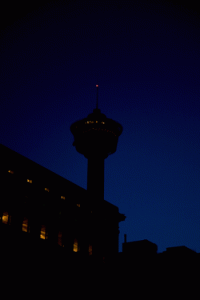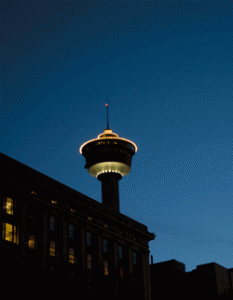Actively slacking
by Zoey Duncan

Photo by Brian Dixon. Though the Sky 360—the rotating restaurant at the top of the Calgary Tower—didn’t stop spinning for Earth Hour, the lights on the outside of the tower were flicked off.
Slacktivism: it’s not in most dictionaries but the more vernacularly inclined Urban Dictionary defines it as, “The act of participating in obviously pointless activities as an expedient alternative to actually expending effort to fix a problem.” Harsh words to apply to an environmentally minded event, but perhaps it is a fitting label for the four-year-old awareness event called Earth Hour.
Earth Hour was founded by the World Wildlife Fund in Sydney, Australia in 2007. On the outside, it appears to be a single hour out of the year when people are asked to turn out their lights to symbolize the need to change our energy consumption behaviours. Whether it has an impact on government policy regarding the environment is hard to judge.
As with most events, there are supporters and detractors of Earth Hour. Catty comments abounded in Calgary Herald comments and on Twitter in the lead-up to the event. Some hecklers pledged to turn on all their lights, run the dishwasher and vacuum the house to protest the so-called PR machine behind Earth Hour.
If nothing else, climate change believers and naysayers alike can agree that switching off non-essential electronics is important if you pay for your own power. But beyond that, perhaps it’s too tall an order to ask the masses, coddled by sparkling skylines and ubiquitously switched-on televisions, to think of power in a new way.
At Olympic Plaza during Earth Hour on March 27, the theme of the party was unofficially “for the children.” Ald. Brian Pincott spoke to the assembled hundred or so people about the importance of preserving the city and the planet for future generations.
After the lights turned off on the Calgary Tower, the City of Calgary municipal building and the partly constructed Bow Tower, Pincott recalled his own dedication to the environment as a youth.
“When I was nine or 10 years old, I grabbed a bunch of my friends together and started an organization,” Pincott said. “And, I was into acronyms, I still am actually, and I called it

Photo by Brian Dixon. Though the Sky 360—the rotating restaurant at the top of the Calgary Tower—didn’t stop spinning for Earth Hour, the lights on the outside of the tower were flicked off.
STOP: Society to Overcome Pollution. We went around and cleaned up garbage and pollution wherever we could find it.”
So, maybe there is hope for the future, when the impressionable elementary school students of today are the ones making legislative decisions about the environment. But using Earth Hour as a symbol of the changes that should be made is pretty hollow. You might even call it slacktivism.
During this Earth Hour, power usage in Calgary from 8:30 to 9:30 p.m. was only reduced by five megawatts – or 0.5 per cent – compared to the previous hour of that evening. In 2009, the drop was one whole per cent, whereas in 2008 power usage in Calgary embarrassingly increased. Toronto, on the other hand, decreased their usage by 10 per cent during the hour this year.
If Earth Hour is about spreading awareness, why not schedule it earlier in the day, when people are going about life in a normal fashion. Why not use that hour to explore how you can reduce consumption during normal activities, instead of playing checkers in the dark when you’d rather be watching television?
“The thing is, is that this can be a lot of fun and I think that there’s this common notion out there that if we’re going to pay attention to the environment, if we’re going to reduce our energy consumption, that we’re going to be sitting at home in the dark freezing and it doesn’t have to be that way,” Pincott said.
Next item on the agenda: Earth Day, with 24 times the activism of Earth Hour. Be there, April 22.



